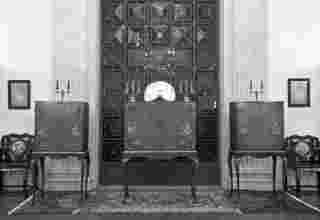
The Security Department in the Baha’i Administration
A Review of the Life and Activities of Kamil Abbas, Member of the Baha’i Security Board
By: Hamid Farnagh
Abstract
This article reviews the life and activities of Kamil Abbas Rida, an Iraqi Baha’i, a member of the local and national Baha’i organizations, and a special and trusted agent of Shoghi Effendi and the Baha’i International Leadership Organization after Shoghi Effendi, in the Baha’i security department.
In this article, we also review the duties of the Baha’i security boards, based on the instructions and messages of Shoghi Effendi, and the Board of the Haifa-based Hands of the Cause (the temporary Baha’i International Leadership between Shoghi Effendi’s death (November 1957) and the establishment of the Universal House of Justice in the summer of 1963), as well as the messages and letters of the UHJ. Through Abbas’s complete reports to Baha’i leaders at different times, several things become clear:
– We realize that the circumstances of the Baha’i Faith and the Baha’is in the Arab countries of Lebanon, Syria, Jordan, Iraq, Kuwait… Saudi Arabia have been very chaotic and troubled, and an atmosphere of distrust and disbelief in the Baha’i leadership prevails. The same condition has been maintained more or less until now.
– Despite the teachings such as the unity of the mankind and expressions such as “See your enemy as milk and sugar…”, Baha’i leaders have a hostile view toward the critic Baha’is!
– The Baha’i Administration and their staffs, knowing and aware of the suspicion of the states and governmental authorities in the Arab-Islamic countries and the Third World toward the Baha’i’s teaching and organizational activities, continue their activities secretly and fraudulently. This behavior has caused the Baha’i Administration and Baha’i security agencies to become a security issue in those countries.
– The paid agents of the security Dept, including members of the Hands of God Institution (later replaced by the Continental Boards of Counselors), and the “Auxiliary Board Members”, such as Kamil Abbas, in order to maintain their status and show their performance important, flatter the Baha’i officials and express hostile statements against the Baha’i critics. Perhaps their literature is sometimes exaggerated, partly to emphasize the value of the work of the security institution!
Keywords
Hands of the Cause, Continental Boards of Counselors, Auxiliary Boards, Kamil Abbas, Security Affairs, Baha’i Security Institution.
A Different Look at Qurrat al-‘Ayn
By: Abdul Hossain Fakhari
Abstract
Dr. Nasereddin Parvin, in his article “The Legend of Qurrat al-‘Ayn: Femininity and Poetry” published in the journal Modern Historical Studies مجله بررسیهای نوین تاریخی reveals several notable dimensions of her life. He begins with a brief biography of Tahirih, highlighting the evolution of her beliefs and her activities in the Bábí movement. He depicts her life, including her marriage and four children, and discusses her role in the Badasht gathering, particularly her unveiling. The article also argues that she was not an active poet, asserting that her attributed poems actually belong to others, and critiques the quality of her prose.
Keywords
Fatimih Baraghani, Qurrat al-‘Ayn, Poetic identity of Zarrin Taj, Mohit Tabatabaei, Shahid-e Salis, Hijab, Badasht, Feminism, Baraghani not being Bahá’í.
A Critique of the Book Fara’ed
Part 2 – Examining the Claim of “Divine Approval of the Bahá’í Faith”
By: Akbar Beyrami
Abstract
The Bahai Proofs (Apologetics) is a key component in the reasoning used by Bahá’í missionaries to attract religiously inclined individuals. These missionaries attempt to convince their audience, particularly in Islamic societies, through these method of reasoning. However, this proofs have faced critiques from various views. This article examines this arguments and analyzes the Bahá’í proofs.
Keywords
Critique of Bahá’í Proofs, Critique of Fara’ed of Abulfazl Golpayegani, Bahai Proofs, Qur’anic objections to the Bahá’í beliefs.
A Look at the Book “Religious Guidance in Refuting the Doubts of the Unbelievers”
By: Narges Haji Ghorbani
Abstract
The book “Religious Guidance in Refuting the Doubts of the Unbelievers ” by the great scholar Ayatollah Sheikh Ahmad Shahroudi is a critique of the Bahá’í Faith. The author refers to the Bahai sources, analyzes their contents, and provides scholarly answers to their objections. The book consists of three sections titled as “Mir’āt al-‘Ārifīn”, “Tanbīh al-Ghāfilīn”, and “Īqāẓ al-Nā’imīn”, each addressing specific aspects of Bahá’í-related controversies and offering explanations to the readers.
Keywords
Ahmad Shahroudi, Prophethood, Prophethood of the Prophet Muhammad (PBUH & HF), Miracle, Finality of Prophethood, Bahai Proofs, Religious Guidance.
A Commentary on the Treatise Asrar-e So’oud (Secrets of Ascension of Shoghi Effendi)
By: Mahdi Habibi
Abstract
The treatise Asrar-e So’oud by Jalal Kohan aims to prove the legitimacy of Mason Remey as the successor to Shoghi Effendi, and to discredit the current Universal House of Justice. Kohan, a Bahá’í who followed Mason Remey after Shoghi Effendi’s death, attempted to show that Remey was designated as the second Guardian. Kohan and his wife, Rizvaniyyah Jafari, eventually requested the Iran Bahai Administration to remove their names from Bahá’í membership to avoid excommunication, and publicly declared their exit from the Faith. Nevertheless, they were excommunicated by the Hands of the Cause. The treatise, written in 1965, includes an introduction and nine chapters. In the first six chapters, he uses Bahá’í sources to argue his claim, then critiques the arguments of those who opposed Remey in chapter seven, highlights inconsistencies of the current Universal House of Justice in chapter eight, and concludes with reasoning on why Shoghi Effendi appointed his successors in the way as he did.
Keywords
Universal House of Justice, Mason Remey, Jalal Kohan, Rizvaniyyah Jafari, Excommunication, Hands of the Cause, Shoghi Effendi, Succession, Bahá’í Faith.
Abu Torab Hoda’ei: Architect of the Collapse of the Bahá’í Faith in Qorveh, Kurdistan (1941–۱۹۴۷)
By: Mohammad Lotfi Pour, Ph.D., Qom Seminary
Abstract
the article examines the role of the late Abu Torab Hoda’ei in countering Bahá’í influence in Qorveh, Kurdistan, during the years 1941 to 1947. Using a mixed research method involving analysis of written works (especially his book Bahá’ísm is Not a Religion), administrative documents, historical reports, and oral accounts, this article explores Hodaei’s cultural, educational, and social efforts. His initiatives, such as mosque restoration, Quran sessions, and academic debates, reinforced the Islamic identity of the community and destabilized the Bahá’í missionary efforts. Accusations by Bahá’ís that he caused sectarian conflicts are refuted according to historical records. Another achievement of this research is the investigation of the Baha’i plots to exile him and the impact of the book “Baha’ism is not a religion” as the first systematic critique of this cult. This study is a step towards rereading the history of anti-deviant cultural struggles and inspiring future research on the role of religious figures in strengthening the religious identity of local communities.
Keywords
Abu Torab Hoda’ei, Qorveh (Kurdistan), Cultural Resistance, Religious Education, Establishment of schools, Scholarly Debates.











